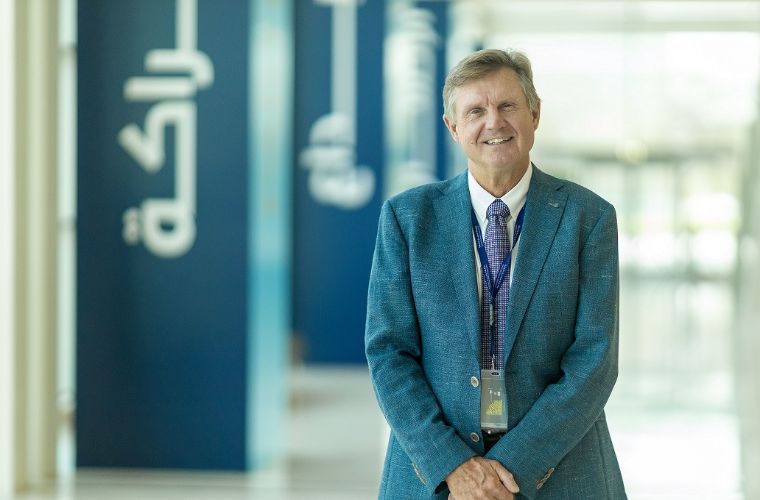What is unique about your college’s programs?
We currently offer a Master of Public Policy (MPP) and we are planning to introduce a unique Master in Social Policy and Program Evaluation (MSPPE) in fall 2022. The MPP is a two-year English language program that started in 2019. Our students complete courses in policy analysis, microeconomics, research methods and design, global and comparative public policy, and public management. In their second year they have advanced seminars and experiential learning to give them a real-world sense of policy challenges and responses. Then they work in small teams with partners on a real policy issue, and develop policy recommendations.
The MSPPE will be the first of its type in the region, giving students specific evaluation skills to assess a wide range of social policy interventions, from family policy to education and health.
Our programs are also unique in being embedded in HBKU and in Education City. At HBKU they are exposed to five other sister colleges and several hard science research institutes, and in Education City there are international partner institutions like Carnegie Mellon, Northwestern, and Georgetown. There are research-related events going on every single day. Students have so many opportunities to learn and grow, it’s incredible.
When they graduate, our students are equipped to advise and support governments and non-governmental organizations grappling with public issues – what’s the problem, what are the options, what works and what doesn’t? They will see public issues from a 360-degree perspective – ethical, technical, and the public interest.
As well as instilling knowledge in its students, HBKU has a reputation for equipping them to become leaders and change-makers in a rapidly changing world. How does your college help students achieve this?
The college specializes in global public policy and local and regional impacts and interactions. What does that mean? Well, Qatar is a country very much affected by global trade, global political forces, and global factors. Think of coronavirus right now, and the impact it is having on travel and the global economy. How are international institutions like the WHO reacting and responding, and coordinating with national governments?
Or think about the Sustainable Development Goals, which all countries, including the Arab region, have signed on to for 2030. There are 17 Goals, often framed as Grand Challenges, and governments are finding themselves struggling on how to translate these commitments into concrete policy actions.
Our students have interests that cover the whole spectrum of public policy, from social issues to economic development to environment. We try to encourage their research in these fields.
In my conversations with government officials and other leaders in Qatar, there is a strong sense that the country has responded exceptionally well to recent challenges, in part due to the vision and leadership of the Amir. However, a lot of technical support is still required in all the ministries and government entities to evaluate policy issues, know what works and what is best practice internationally, and help assess progress and make adjustments. The work of policy analysts, in other words.
How does the multidisciplinary aspect of an HBKU education make the university stand out?
Well, almost any university is going to be multidisciplinary in the sense that a university has many programs. In speaking for my own college, our two programs bring together a wide variety of different disciplines within the social sciences. For example, our students in the MPP will be taking political science, economics, research methods, as well as seminars in various policy fields such as environment and social policy, and on top of that they'll be doing a capstone which brings together the different streams of work that they've done previously in their program. Another strong feature of our programs is the emphasis on ethics, and the interface between global policymaking and local and regional challenges. This inevitably brings together a variety of disciplines and forces students to think in multiple dimensions about complex problems.
For me, one of the most impressive features of HBKU is its international networks and its exposure to scholars and researchers around the world. It's part of the mandate of the university and of the Qatar Foundation more generally to engage regionally as well as internationally, and as a young university we want to leverage our international connections as much as possible. What that means is, from a student’s perspective, is that there are almost endless opportunities for exposure to international conferences, visitors, and other types of events that really highlight the range of disciplines that need to be brought to bear in dealing with major issues and challenges
If I were a prospective student who was considering an HBKU education, what would your college’s biggest selling point be?
We have several selling points. The first is the students themselves. A student coming to our college will be exposed to, and engage with, students from the region, from the world, and of course Qatari students as well. Not only do we have a diversity of students, but I'm happy to say that because of the selectivity of the admissions process, we have been able to attract extraordinarily good students into the program. So, a student coming to HBKU, and to the College of Public Policy, will have the opportunity to work with the best, and to be challenged by them.
The second selling point is the faculty. We have a small but extraordinarily talented group of faculty members here at the College of Public Policy. They have international reputations, extraordinary research programs, and they are great teachers and communicators. We have tried to encourage a culture of support for students, as well as engagement with their work. Our students have an extraordinary classroom experience. Classes are small, instructors are energetic and challenging, and we've tried to ensure that the learning process is exciting as well as foundational.



